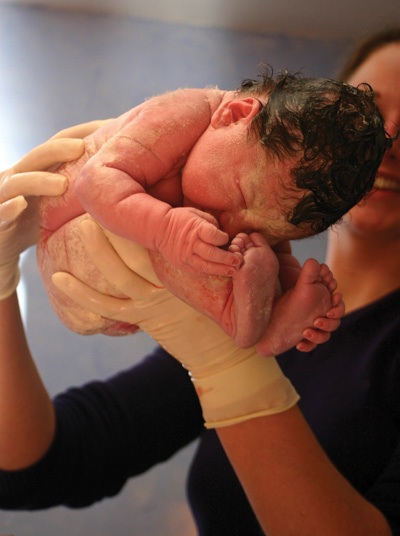 Corey Colwell-Lipson, an Issaquah resident, opted for a midwife over an obstetrician-gynecologist for the birth of her two children. “Childbirth is a normal and natural experience,” says Colwell-Lipson. “It is not a medical emergency.”
Corey Colwell-Lipson, an Issaquah resident, opted for a midwife over an obstetrician-gynecologist for the birth of her two children. “Childbirth is a normal and natural experience,” says Colwell-Lipson. “It is not a medical emergency.”
Stephanie Flath of Preston, Wash., switched to a midwife in the sixth month of her first pregnancy. She wanted to be “more connected to the birth,” she says, and hoped to have her husband more involved with the birth experience.
Around the Northwest, it’s common to hear about neighbor, a colleague or a friend who has given birth with the help of a midwife. But according to the 2007 National Vital Statistics Reports, a midwife attends only 8 percent of births in the United States. The reason? Many women assume their insurance will not cover a midwife (most insurance plans do). Some wonder about midwives’ educational background and qualifications. Others simply do not realize they have a choice.
What to expect
Midwives specialize in normal pregnancy and childbirth, and help educate women during their pregnancy, says Mary Mittell, certified nurse midwife (C.N.M.) and midwifery manager with Neighborcare Health in Seattle. “Women and their partners should expect their questions to be answered thoroughly by the midwife,” she says. “They should also find that midwives are willing to adjust the care they provide according to the family’s specific preferences and wishes, as long as it is safe.”
While some obstetricians show up at the end of labor just for the birth itself, a midwife is more likely to be actively involved in labor support, says Mittell. Midwives are also active supporters of breastfeeding.
Some women, looking for a different kind of birth experience, choose a midwife over an obstetrician the second or third time around. Mittell says that women describe prenatal appointments with physicians that were too short or didn’t provide enough education. Other women, their first child born by cesarean section, hope to have their next child vaginally and feel a midwife would be more likely to support that choice.
A 2008 report by the Cochrane Collaboration (a not-for-profit group that conducts health care studies) concluded that more women should be offered the option of midwife-led care. The study showed that during the labor process, women assisted by midwives were more likely to have control over positioning, pushing and even some medical procedures.
Flath says her midwife took extra time with her and discussed the birth process. Her husband, Matt, felt more involved and less nervous about seeing her in pain, she says. “He felt [the midwife] listened to our concerns and answered our questions better.” According to Mittell, prenatal appointments are generally longer with midwives than with obstetricians. “Generally, we are more flexible about accommodating the personal preferences of the families we care for,” she says.
Midwives provide information so that families can make their own, informed decisions about their care, says Mittell. And the healthcare system benefits when women choose a midwife for healthy, normal pregnancies. “In a larger sense, using midwives to care for healthy, normal pregnancy frees OB/GYNs to care for higher-risk and more medically complex women, which is a better use of our medical resources.”
With midwives, women can often decide where they’d like to give birth: at home, at a birthing center or in a hospital, says Colwell-Lipson. She believes that “beautiful births and birth outcomes” can happen in any location with any provider, and hopes women choose the provider and place with which they feel the safest and most comfortable.
Colwell-Lipson recommends that women interview midwives and obstetricians, and not be afraid to change routes midcourse. “It’s never too late to change providers,” she says.
Karen Dawson, owner of Dawson Communications Group, lives with her husband and two children in Maple Valley, Washington.
Midwife Resources:
Midwives Association of Washington State
Midwives of Washington, Washington Chapter of the National College of Nurse-Midwives
National College of Nurse-Midwives
The Thinking Woman’s Guide to a Better Birth by Henci Goer









